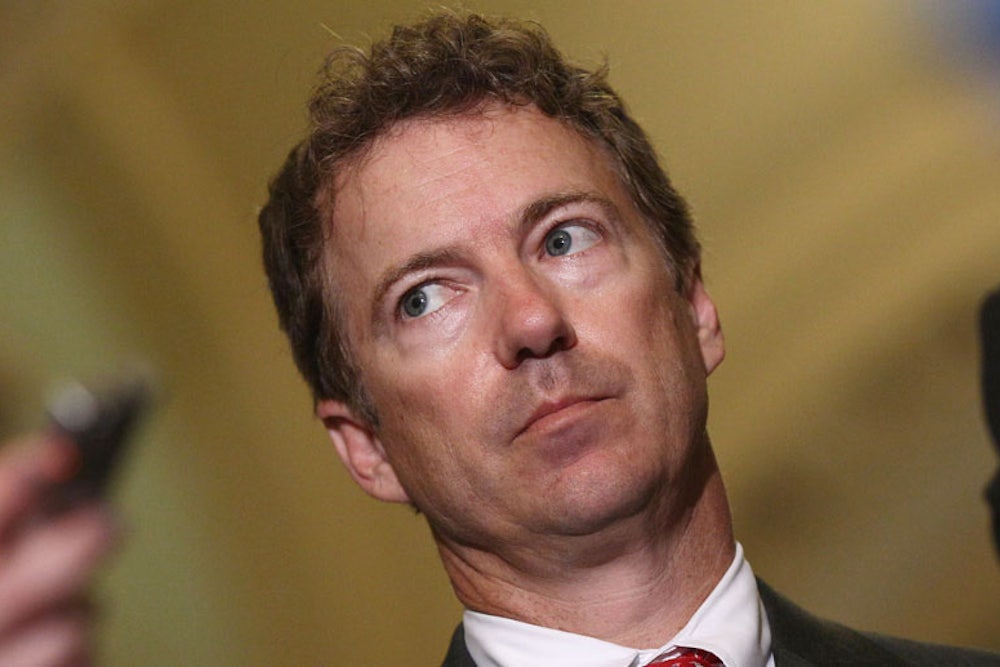Libertarianism is suddenly in fashion. Denouncing the NSA, Rand Paul draws cheers both from young leftists in Berkeley and young conservatives in D.C.—and narrowly leads in early polls for the 2016 presidential nomination. The Koch brothers—who once bankrolled the Libertarian Party—plan to spend whatever it takes to elect anti-tax, anti-regulation Republicans. Same-sex marriage and the legalization of weed continue to gain support among the public and in the courts, while a majority of Americans recoil from a law that requires them to buy health insurance. Is a nation founded, in part, to defend individual freedom now ready to embrace politicians who will rigorously apply that principle to every significant matter of state?
Libertarianism may be on the rise, but it has no real chance of taking over the Republican Party, much less the nation. A daunting set of obstacles lies in the path of true believers who would shrink the government down to Gilded Age dimensions.
The most obvious hurdle is that Americans may dislike “big government,” but they cherish their federal benefits. The libertarian charge, made most recently by Paul Ryan, that entitlement programs harm the people they are supposed to help speaks to few recipients of Social Security or Medicare (even elderly Tea Partiers), much less to anyone cashing an unemployment check or being cared for at a VA hospital. And even most Republican businessmen would resist stripping away tax credits for homeowners and subsidies for energy and agriculture—just to name some of the biggest examples of “corporate welfare.”
Second, it’s one thing to rile against an agency that monitors your phone calls but quite another to advocate, as authentic libertarians do, the demolition of the "national security" state first established during World War II and expanded after the attacks of September 11. If Rand Paul bases his presidential hopes, in part, on scaling back the powers of intelligence agencies and bringing the U.S. military back home, GOP heavies like McCain, Graham, and Rubio—backed up by millions of servicemen and women, past and present—will be glad to dash them.
Third, any Republican who promotes a coherent libertarian agenda will have to do battle with Christian conservatives—still the party’s largest and most faithful constituency and one whose definition of “freedom” excludes abortion rights and gay marriage. Paul understands this, of course; he is careful to declare he is “100 percent pro-life,” and he opposed the recent decision by a federal judge who ordered Kentucky to recognize same-sex unions from other states. But if he emphasized such views, he would destroy his image as an apostle of untrammeled liberty, particularly among the young people who rallied to his father’s candidacy. So, in early primary states like Iowa and South Carolina, Paul will have to straddle the social issues or avoid them. Most Republican voters who seek a fierce defender of “family values” will probably look elsewhere.
Fourth, libertarians have a weakness for conspiracy-mongering and foolish statements. They tend to believe with Ron Paul that “the Federal Reserve is the main cause of the boom-and-bust economy, as well as the leading facilitator of big government and crony capitalism” and long to return to the gold standard. Almost 50 years after passage of the Civil Rights Act, Rand Paul still thought it was wrong to require the owner of a private business to serve customers of all races—although he now denies he said that. An unswerving devotion to individual liberty can attract a devoted corps of activists. But most who stand outside that self-reverential band would agree with Emerson’s famous observation that “a foolish consistency is the hobglobin of little minds.”
Ideological zealots fascinate journalists and scholars, but they have never dominated American politics. New Deal liberals triumphed far more because they met mass demands for jobs, security, and civil rights than because they bashed the corporate rich or preached about the Four Freedoms. Ronald Reagan and his fellow conservatives rose to power by indicting the shortcomings of federal programs and Jimmy Carter’s failed foreign policy, not because they made a strong case against “big government.”
In fact, if not political rhetoric, the United States has never been a libertarian nation. Even during the Gilded Age, the federal government financed, through loans, the building of the transcontinental railroads and subsidized American industry through high tariffs (taxes, by another name). Many individual states, using the “police power,” also banned the liquor traffic and segregated the races. Libertarianism is a grand aspiration of Americans who wish they could live in a society in which the only government that mattered would be the government of oneself. Like all utopian wishes, it will never be granted.
Michael Kazin’s most recent book is American Dreamers: How the Left Changed a Nation. He is editor of Dissent and teaches history at Georgetown University.
